Er zijn veel onheilspellende tekenen die aangeven dat je naar een gastro-enteroloog moet en in dit bericht leer je op welke symptomen je moet letten. Een gastro-enteroloog is een medische professional en arts die een strenge en uitgebreide opleiding heeft gevolgd om te leren omgaan met, behandelen en genezen van medische omstandigheden die verband houden met het maagdarmkanaal. Deze gebieden omvatten de darm, de maag, de lever, de slokdarm en het rectum.
Met een dergelijke titel die meer dan 5 jaar opleiding in "interne geneeskunde" en "gastro-enterologie" vereist (na voltooiing van de medische opleiding); GI-artsen bieden uitzonderlijke zorg en behandeling en zijn over het algemeen succesvoller dan artsen als het gaat om de diagnose en behandeling van gastro-intestinale complicaties.
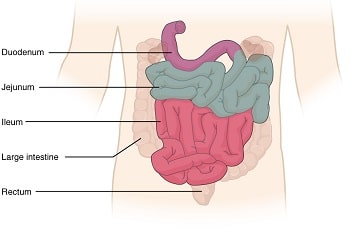
Inhoudsopgave
Gastro-enterologen krijgen een gespecialiseerde opleiding in "endoscopie", wat de praktijk is van het gebruik van een kleine en smalle, maar flexibele "buis" met een ingebouwde camera die zal worden gebruikt om tijdens procedures, operaties of diagnostische tests door het maagdarmkanaal te navigeren om te zien of er iets is. ziekten of gezwellen aanwezig zijn.
Als het gaat om gastro-intestinale medische problemen, zal het zoeken naar de behandeling van een gastro-enteroloog ervoor zorgen dat u de meest effectieve behandeling krijgt die mogelijk is omdat u wordt behandeld door een medische professional die de unieke en diepgaande trainingservaring heeft die zich zal vertalen in het ontvangen van zowel hoogwaardige als "uitgebreide" behandelingszorg voor alle GI-gerelateerde medische complicaties die u mogelijk tegenkomt.
Het is statistisch bewezen door het gebruik van onderzoeken dat gastro-enterologen colonoscopieën en uitgebreide zorg voor gastro-intestinale problemen uitvoeren met een hoger succespercentage in vergelijking met de behandeling(en) die door andere soorten artsen worden gegeven. Wat dit voor u betekent, is dat u een behandeling krijgt die de aanwezigheid van kanker of poliepen nauwkeurig detecteert, terwijl de kans op een medische complicatie als gevolg van de behandeling afneemt (GI-behandelde patiënten kunnen ook verwachten dat ze minder tijd in het ziekenhuis).
In dit artikel behandelen we de "Top 15 waarschuwingssignalen die u naar een gastro-enteroloog moet zien", die u zullen helpen bepalen of u de symptomen heeft van een medische complicatie die de aandacht en behandeling van een GI vereist. dokter.
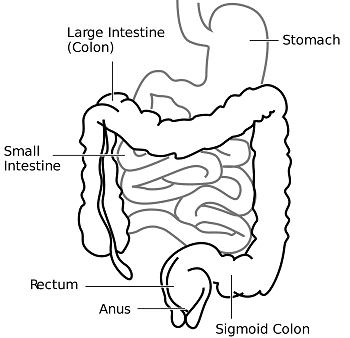
Wanneer u voor het eerst nieuw gevormde "pijn" of tekenen/symptomen die voortkomen uit het spijsverteringskanaal, zoals brandend maagzuur, buikpijn, diarree of constipatie, begint te herkennen, kunt u zich afvragen of u al dan niet naar een reguliere arts moet gaan, een internist of een gastro-enteroloog (spijsverteringsspecialist). Wie u kiest om uw aandoening(en) aan het begin te diagnosticeren, kan van een aantal factoren verschillen.
In sommige situaties kan het onduidelijk zijn om de juiste keuze te maken om naar een arts of gastro-enteroloog te gaan, maar hieronder helpen we u de symptomen te begrijpen om op te letten voor gastro-intestinale problemen die door een GI-arts moeten worden gediagnosticeerd en behandeld.
Als u nu voor de allereerste keer symptomen of pijn in het spijsverteringsgebied ervaart, kan de eerste stap zijn om advies in te winnen bij uw huisarts, zoals uw huisarts of internist.
Dit zal hopelijk een arts zijn met wie u in de loop van de tijd een relatie hebt opgebouwd, aangezien hij/zij volledige toegang heeft tot uw medische en behandelingsgeschiedenis, die kan worden beoordeeld om te helpen bepalen wat de oorzaak is van de symptomen die u ervaart.
Nadat u uw arts heeft ontmoet en hem/haar uw symptomen heeft gegeven, zal er een lichamelijk onderzoek worden uitgevoerd om te bepalen wat wel of niet moet worden getest. Zodra de arts het lichamelijk onderzoek heeft afgerond en een goed idee heeft van de oorzaak van de plotselinge gastro-intestinale pijnen, kan hij bepalen dat behandeling moet worden gegeven door een specialist die affectieve herstelzorg kan bieden. In dit geval zou de "specialist" de gastro-enteroloog zijn.
Dr. Tarugu, een ervaren en bekroonde gastro-enteroloog uit Zuid-Florida beveelt aan dat personen die consequent sporadische of terugkerende opflakkeringen ervaren bij eerder gediagnosticeerde aandoeningen (zoals colitis ulcerosa, de ziekte van Crohn of IBS), onmiddellijk een behandeling moeten zoeken bij een gastro-enteroloog om verdere groei of complicaties te voorkomen sterk> volwassenheid.
Tijdens uw behandeling door de gastro-enteroloog zal hij/zij uw arts informeren over de status van uw aandoening(en) en de voortgang die wordt geboekt. Deze updates zullen uw huisarts helpen om een goed begrip te krijgen van uw status, wat de arts zal helpen om u de juiste zorg te bieden op de lijst als ondersteuning na herstel. Een paar andere gastro-intestinale aandoeningen die GI-artsen behandelen, zijn ziekten die zich in het pancreasgebied of de lever bevinden.
Als uw huisarts vermoedt dat er zich problemen voordoen in deze gebieden, dan is het veilig om aan te nemen dat u wordt doorverwezen naar een plaatselijke gastro-enteroloog voor een diepgaande diagnose en dat er een behandelplan kan worden opgesteld.
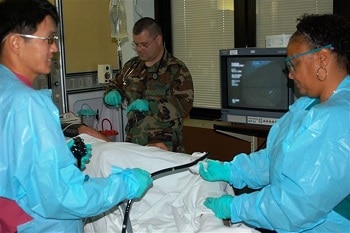
Elk zijn unieke tekenen van potentieel ernstige aandoeningen die niet als "niet belangrijk" mogen worden afgedaan, aangezien elk van de hierboven genoemde symptomen kan leiden tot veel ergere complicaties als ze niet "vroegtijdig" worden gediagnosticeerd en behandeld.
Hieronder bespreken we wat elk van deze symptomen kan betekenen en waarom het belangrijk is om zo snel mogelijk de hulp en behandeling van een GI-arts in te roepen.
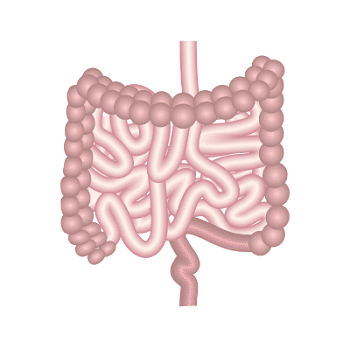
Geschat wordt dat in totaal 60 miljoen mensen in de VS gemiddeld minstens één keer per maand last hebben van brandend maagzuur, en naar schatting 15 miljoen mensen die "dagelijks" aan de aandoening lijden. Symptomen van zure oprispingen (brandend maagzuur) komen het meest voor bij zwangere vrouwen en oudere personen.
Er is een aandoening die "gastro-oesofageale reflux" wordt genoemd, een lichamelijke aandoening die ervoor zorgt dat maagzuur terugstroomt en terugkeert in de slokdarm. Hierdoor zullen sommige mensen helaas de symptomen ervaren die hieruit voortkomen wanneer dit proces plaatsvindt (wat dagelijks, wekelijks of maandelijks kan zijn).
Een van de eerste tekenen van een bezoek aan een gastro-enteroloog voor brandend maagzuur is de ervaring van het voelen van een verwarmd ongemak vanuit de regio achter het borstbeen. Dit gevoel heeft de neiging om over te gaan naar de keel en nek, dus ongemak van welke aard dan ook in dit gebied zou een waarschuwingssignaal moeten zijn dat u naar een gastro-enteroloog moet voor diagnose/behandeling.
Een ander waarschuwingssignaal van zure reflux is een "zure" of "bittere" smaak achter in uw keel, aangezien dit de smaak van maagzuur is. Aangezien de symptomen van brandend maagzuur tot enkele uren kunnen aanhouden (en verergeren bij het eten), zou een dergelijke aanhoudende opwinding in dit gebied u ertoe moeten aanzetten onmiddellijk diagnostisch onderzoek te laten uitvoeren door een GI-arts.
Als u dergelijke symptomen 2 of meer keer per week ervaart, of als u last heeft van gewichtsverlies, bloedverlies of voedsel dat blijft plakken, dan kunt u last krijgen van brandend maagzuur dat zeer ernstig is. Als dergelijke symptomen optreden, heeft u mogelijk een aandoening die bekend staat als "gastro-oesofageale refluxziekte (of "GERD voor injectie).
Voordat u de exacte oorzaken van GERD of gastro-oesofageale refluxziekte kunt begrijpen, moet u eerst begrijpen wat de oorzaken van brandend maagzuur zijn. Een meerderheid van de mensen zal de opwinding van brandend maagzuur voelen als de slokdarmwand gedurende langdurig in contact komt met maagvloeistoffen. .
Deze maagvloeistoffen bestaan uit een paar verschillende materialen, waaronder spijsverteringsgerelateerde enzymen en zuur. Omdat het maagzuur in contact blijft met het slijmvlies van de slokdarm, kan er een beschadiging van de slokdarm optreden, wat resulteert in een onaangenaam, branderig en pijnlijk gevoel.
Terwijl een gespierde klep naar de onderkant van de slokdarm (bekend als de "lagere slokdarmsfincter" of "LES") zuur in de maag en weg van de slokdarm houdt (indien goed functionerend), is dit niet het geval als een persoon ofwel "Gastro-oesofageale refluxziekte" of "GERD", aangezien de "LES" de neiging heeft om regelmatig te ontspannen, waardoor het maagzuur terug kan terugvloeien naar de slokdarm.
Een dergelijk symptoom moet zo snel mogelijk worden behandeld door een GI-arts om de ontwikkeling van verdere complicaties te stoppen.
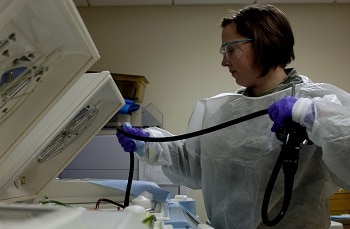
Bij een bezoek aan uw GI-arts wordt op basis van de diagnostische resultaten een behandel-/herstelplan opgesteld.
Als u merkt dat u meer dan twee keer per week zelfmedicatie gebruikt voor brandend maagzuur, dan is dit alleen al een teken dat u door een gastro-enteroloog moet worden behandeld. Aandoeningen die niet worden behandeld door een ervaren GI kunnen mogelijk leiden tot een ernstiger complicatie.
Heeft u problemen met het doorslikken van voedsel? Moeite met het afnemen van vloeistoffen? Ervaart u sporadische of aanhoudende zwelling in de keel? Als dit het geval is, kan dit mogelijk een waarschuwing zijn voor een lichte of ernstige aandoening die u ertoe zou moeten aanzetten een gastro-enteroloog te raadplegen voor een diagnose. "Elke vorm van pijn of opwinding veroorzaakt door drinkwater kan een waarschuwing zijn voor een ernstig maag-darmprobleem", zegt Dr. Vikram Tarugu, een ervaren, door het bestuur gecertificeerde en bekroonde gastro-enteroloog.
Andere waarschuwingssignalen die de gastro-enteroloog moet weten, zijn of uw slikproblemen al dan niet gepaard gaan met de hik, heesheid van de keel, frequent hoesten of een vol gevoel na het eten van een zeer kleine portie voedsel. Als een van deze potentieel gevaarlijke waarschuwingssignalen optreedt, kan de oorzaak mogelijk zijn van slokdarmkanker. Als u een van deze waarschuwingssignalen ervaart, Aarzel dan niet om raad te vragen van uw primaire arts of een gastro-enteroloog als u al een relatie met een heeft. Ruik je een ongewone geur van het passeren van gas? Dit zou kunnen zijn een waarschuwingssignaal voor infectieuze parasieten
Verrassend genoeg passeert de gemiddelde persoon gemiddeld bijna 2 liter gas per dag, tenzij er afwijkingen plaatsvinden in het spijsverteringskanaal. Een waarschuwingssignaal waar u goed op moet letten, is als u pijn of ongemak ervaart in de buikstreek tijdens het plassen of bij het maken van een stoelgang.
Bovendien, als de stoelgang en het passeren van gas een ongewoon vreselijke geur beginnen te krijgen, kan dit een teken zijn dat u Giardia heeft, een parasiet die de darmen irriteert en infecteert. Aangezien Giardia kan verergeren als het niet wordt behandeld, mag een waarschuwingssignaal als dit niet over het hoofd worden gezien.
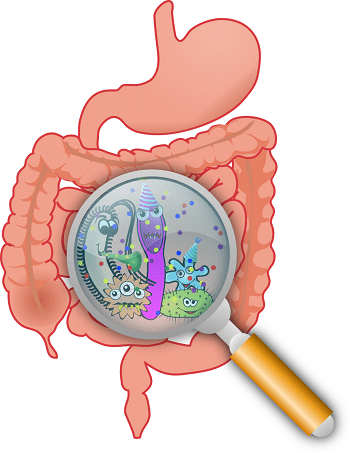
We hebben allemaal ooit een opgeblazen gevoel ervaren, maar als het aanhoudend wordt, is er een mogelijkheid dat er een onderliggende oorzaak is. Als je merkt dat je moeite hebt met het aantrekken van je korte broek terwijl je ze een paar dagen geleden nog zonder problemen droeg, dan is dat misschien niet de schuld van je "niet naar de sportschool gaan".
Een opgeblazen gevoel treedt eenvoudig op wanneer onze inname van voedsel/lucht te veel is en ons lichaam er niet goed van afkomt. Als een opgeblazen gevoel echter abrupt begint zonder duidelijke reden (je hebt al een tijdje niet gegeten) en optreedt naast de aanwezigheid van pijn of bloed in de ontlasting, dan kan dit een waarschuwing zijn dat het tijd is om naar een gastro-enteroloog te gaan.
Een dergelijk teken zou mogelijk kunnen betekenen dat de ontwikkeling van coeliakie, GERD (Gastro-oesofageale refluxziekte), IBS (Prikkelbare Darm Syndroom), constipatie of galstenen is begonnen.
In elk geval dat u bloed in uw ontlasting of abnormale scherpe pijn in de buikstreek herkent bij het gasgeven of het maken van een stoelgang, moet u zeker worden gediagnosticeerd en behandeld door een GI-arts.
Een waarschuwingssignaal dat door een GI-arts moet worden gediagnosticeerd, is plotseling, onverwacht en onverklaarbaar gewichtsverlies. Hoewel plotseling gewichtsverlies kan worden toegeschreven aan verschillende andere gezondheidsgerelateerde problemen, is de spijsvertering meestal de beste plaats om naar de oorzaak van het probleem te zoeken.
Dr. Tarugu, een door de raad gecertificeerde gastro-enteroloog in Zuid-Florida met meer dan 2.100 succesvol voltooide procedures, verklaarde dat "de eerste problemen die u wilt isoleren als de oorzaak van plotseling gewichtsverlies kanker van de maag, alvleesklier of dikke darm is".
Raadpleeg daarom een gastro-enteroloog als u plotseling gewicht verliest, zodat u zeker weet dat het geen kanker of chronische/coeliakie is (die het vermogen van uw lichaam om essentiële voedingsstoffen op te nemen zou verminderen).
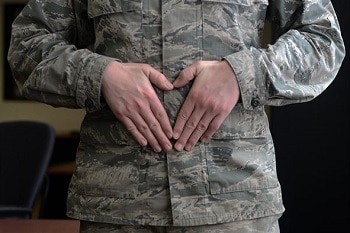
Tijdens het maken van een stoelgang, zou het waarschijnlijk een beetje zorgwekkend zijn om enkele roodachtige sporen op te merken op het toiletpapier, want we weten allemaal dat bloeden uit zo'n gebied niet normaal is. Een bloeding uit het rectumgebied kan een teken zijn van een mogelijk gevaarlijke aandoening en moet "onmiddellijk" worden gediagnosticeerd en behandeld.
Hoewel het mogelijk is dat de bloeding wordt veroorzaakt door aambeien, als dat niet het geval is, is het absoluut noodzakelijk om een gastro-enteroloog te zoeken, vooral als de bloeding opnieuw optreedt en als de persoon ouder is dan 40 jaar.
Indigestie (ook medisch aangeduid als "dyspepsie") is de term om een aandoening te beschrijven die meerdere verschillende symptomen met zich meebrengt die optreden tijdens het eten van een maaltijd. Sommige van deze symptomen kunnen zijn:het gevoel "vol" te zijn als u eenmaal een maaltijd hebt voltooid, naast een "pijn" of een "branderig gevoel" in de bovenbuik.
Indigestie is een vrij veel voorkomende aandoening bij volwassenen van middelbare tot oudere leeftijd en komt maandelijks, wekelijks of zelfs dagelijks voor.
Als u een van de volgende symptomen ervaart, is het essentieel om advies en behandeling te vragen aan een GI-arts om complicaties te voorkomen:
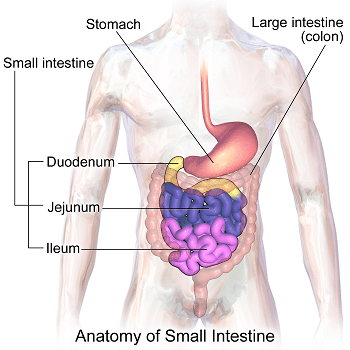
When visiting your GI doctor a treatment/recovery plan will be formulated based upon the diagnostic results.
Possible treatment suggestions may include:
Keep in mind that indigestion and heartburn are two different conditions with each having their own unique symptoms.
However, if you’re experiencing the symptoms of both then it’s possible that you’re suffering from both of the two. Regardless, whether the agitation is minor or severe it’s important that you take such a warning signal seriously and seek treatment from a GI doctor that will help to diagnose and remedy the condition(s).
Nausea is quite an unpleasant experience and can use intense feeling of dizziness, minor to severe discomfort and paint in the abdominal area. On the other hand, often times accompanies by nausea, vomiting is the occurrence of a contraction from the stomach that during times of nausea can help one feel a bit better as the content of stomach is during vomiting is the process in which it’s propelled up thru the esophagus.
Intense and consistent vomiting could possibly be a warning sign of a Gastroenteritis which can be treated by a gastroenterologist. Gastroenteritis is known to be a viral infection that causes inflammation within the digestive tract and can be treated thru the use of medication(s) which will be recommended by the gastroenterologist that you choose to visit.
Are you experiencing a dullish pain in the stomach, weight loss, the undesired to intake food due to pain or nausea/vomiting? If so, this could be a sign of a minor yet serious matter. Such warning signs could possibly mean that you’re suffering from a Peptic Ulcer which can be diagnosed by a gastroenterologist thru the use of an upper GI series or an endoscopy.
If you’re experiencing upper abdominal pains (one of the biggest signs of a stomach ulcer ) be sure that you seek the diagnosis/treatment from a GI doctor so you can have it treated while preventing the possibly of further complications arising from the condition.
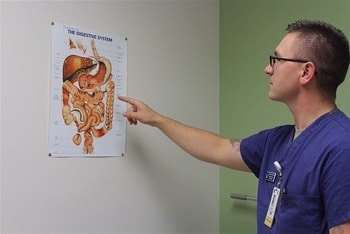
Individuals that may have GI disorders can suffer from warnings signs that are both painless and pain-induced. Such symptoms can be diarrhea/constipation (in some cases, irritable bowel syndrome). Such signs, whether they’re painful or not, could possibly be a sign of a condition other then IBS known as “centrally mediated abdominal pain syndrome” (or “CAPS” for short) which used to be medically referred to as “functional abdominal pain syndrome” (FAPS).
CAPS is a gastrointestinal disorder and is typically caused by a change in the nerve impulse sensitivity and will cause intense and frequent pain in the abdominal section which for some individuals will be quite severe.
In some cases, pain can be so intense and persistent that it’ll affect you in the similar way as the pain from a tooth ache as it can consume your focus/life since it has a tendency to “not go away” for extended periods of time. If such warning signs are present, seek counsel from a gastroenterologist where an antidepressant may be prescribed to not only reduce anxiety caused by the pain but to help alleviate the pain all together.
If you’re experiencing the feelings of belching, bloating or flatulence (build-up of gas in the alimentary canal), these could be warning signs that you you could possibly be suffering from a number of different conditions including allergies to certain foods, lactase deficiency, peptic ulcer disease or a H. Pylori Infection. Each of these we’ll cover below more in-depth so you can determine the possible cause(s) of your symptom(s).
Food Allergies – While not typical, the most severe allergic reaction that one can inherit from the ingestion of food is known as “anaphylaxis” which could possibly be life-threatening. Studies have shown that 90% of all allergies related to foods are caused from the ingestion of soy, wheat, shellfish, tree nuts, fish, peanuts, milk and eggs. If pain tends to arise after consuming such food items then this may be a signal that you need to seek the treatment of a gastroenterologist.
Lactase Deficiency – While lactase deficiency is pretty common with an estimated 3 million cases per year alone within the US, it’s an issue that’s brought upon individuals whose body has difficulty with digesting the sugar contents within dairy products. These issues arise in the digestive tract and can be treated by a GI doctor thru the use of recommended off-the-shelf medication(s) or by a prescribed medication (depending on the severity of your condition.
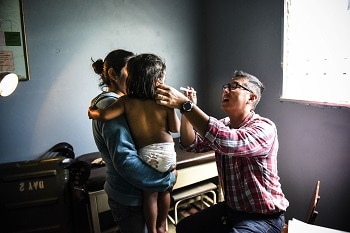
Individuals suffering from “Lactase Deficiency” can expect such warning signs to arise within 30 minutes to 2 hours from the consumption of milk or other food items containing dairy.
While symptoms aren’t always noticeable there are some warning signs that if arise should prompt you to see a gastroenterologist.
If you experience persistent and severe abdominal pain, have difficulty with swallowing or have bloody/black vomit that has the appearance of coffee grounds then seek diagnosis from a GI doctor for treatment as these are all warning signs that need attention before complications arise.
If you experience a yellowing of the eyes/skin then it’s very well possible that this is the warning sign that Jaundice is occurring. Jaundice is a condition in which there’s an excessive amount of bilirubin in the blood which is known, medically, as hyperbilirubinemia.
Bilirubin is a “yellow pigment” substance that affects the color pigmentation in the white of your eyes and your skin tone.
If you’re experiencing such signs of this condition schedule an appointment to see a GI doctor as quickly as possible as if not, further complications could develop which could lead to:
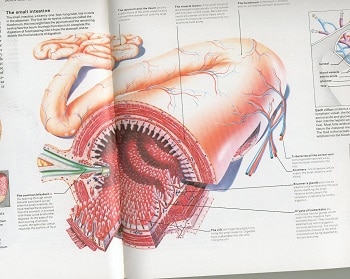
One warning signing of a possibly serious complication that should be diagnosed immediately is pain experienced in the abdominal section with the occurring pain spreading/radiating to your back. Such a feeling is a strong indicator and warning sign of “gallstone pancreatitis ”.
Gallstones are a pretty common cause of pancreatitis and this is caused by gallstones that develop in the gallbladder to block the bile duct which puts a stop to the pancreatic enzymes from being able to travel to your small intestine (which forces them to return to the pancreas).
During this process, these pancreatic enzymes will agitate the pancreas cells which will cause inflammation which can cause a great deal of pain that will radiate from the abdomen to the back. In some cases, this feeling of pain will also be accompanied by a tingling, prickly sensation. If such warning signs arise, seek attention from a physician or preferably a gastroenterologist who will help to diagnose the issue so proper treatment can be prepared/prescribed.
In the event that the gastroenterologist determines that your pancreatitis us due to the gallstones then an ECRP (Endoscopic Retrograde Cholangiopancreatography) will be performed which is a procedure conducted by the GI doctor to remove the stones.
For heavier/obese women it’s important to take cautious note of any pain that stems from the upper right-hand side of the abdominal sections as such a pain could be the indicator of “gallstone pancreatitis” (a prominent condition for heavier-set women). What’s causing such pain is the process of the gallstones blocking the bile duct which causes a chain reaction as this will stop any/all pancreatic enzymes from traveling to the small intestine providing the enzymes with no choice but to return to the pancreas. If the gallstones travel from the gallbladder to the common bile duct, gallstone pancreatitis can develop which is a condition that can continue to worsen and mature in pain while also leading to further complications if not treated.
If you’re medically considered to be “obese” and have had such pain on a regular or consistent basis, consult a GI doctor as treatment in the form of medication and surgeries are available (depending on the severity of the condition). Only making 1-2 bowel movements per week? Difficulty with going? Pain during defecating?
There are a few signs to look out for and notate when looking for signs of possible gastrointestinal complications. A few of these signs include difficulties with making bowel movements, only making 1-2 bowel movements per week or if you experience pain during defecating. Constipation is considered to be present whenever an individual is making only 1-2 bowel movements per week so if this persists this alone could be a warning sign of “anal fissure”. With an estimated 200,000 cases per year within the US alone, anal fissure is a condition that refers to the tearing in the lining of the anus which can cause an immense amount of pain during all three scenarios we referred above (making bowel movements and pain during throwing-up).
Anal fissures develop throughout the specialized tissues that line both the anus and anal canal and this is called the “anoderm”. The reason this can be (and more than likely “will be”) so painful is because of the over-abundance of nerves located within the anal canal. Diagnosis and treatment from a gastroenterologist is recommended. Typically, diagnosis of this condition can be determined by the physical inspection of area with either medication or surgery being recommended to treat (depending on the severity of the anal fissure).
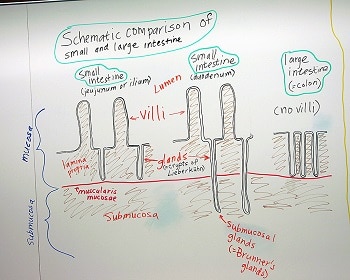
If you’re experiencing symptoms of a condition that includes intense and regular fevers, nausea/vomiting and diarrhea then notate these warning signs to show a gastroenterologist as these are signs of a possibly serious condition known as “bacterial gastroenteritis” which will need to be treated to prevent complications that could arise.
Bacterial gastroenteritis is a condition that develops and occurs whenever bacteria infiltrates your gut can and initiates an infection. If this occurs, inflammation will develop both in your stomach and intestines which will cause discomfort to say the least. Typical symptoms of “bacterial gastroenteritis” includes severe, extreme and persistent cramps in the abdominal area in addition to diarrhea/
While viruses are responsible for the majority of gastrointestinal infections bacterial infections are nearly just as common. A majority of people refer to bacteria-initiated infections as “food poisoning”.
There are a few different causes of “bacterial gastroenteritis” which can be poor hygiene habits, coming in close contact with pets or animals or from consuming foods/fluids that are contaminated with bacteria (even air-borne bacteria). If such warning signs arise, seek medical attention from a physician or preferably a gastroenterologist so the issue(s) can be properly treated to above any further development of bacterial growth.
First and foremost, any sign(s) of rectal bleeding is “not normal” and should never, in any scenario, be dismissed as a minor or non-severe matter as it’s a serious occurrence that requires the attention and treatment from a gastroenterologist.
One of the most prominent signs and symptoms of “irritable bowel syndrome” (IBS) is rectal bleeding and the presence of blood in the stool. In some circumstances, a warning sign is not making a bowel movement at all or only 1-2 times per week.
Blood expressed from the body caused IBD will appear to be “bright red” while if blood is originating from the upper area of the digestive tract the blood will be darker (dark/black stools). If such a sign has arisen be sure that you notate the darkness of the blood so you can provide this detail to a gastroenterologist who will use this information as a part of the diagnosis and treatment(s). In any case, if bleeding from the rectum is “severe” or if you’re throwing-up blood than this is a sign of a severe condition occurring which needs medical attention “immediately”.
Furthermore, such signs could also be a warning sign that you’re suffering from either “Crohn’s disease” or “ulcerative colitis” which are also conditions that you’ll want to have inspected by a GI doctor. Chron’s disease is a condition affecting 200,000 individuals per year and is a chronic, inflammatory irritable bowel disease that runs alone the digestive tract lining.
Ulcerative colitis is another chronic disease that inflames the bowel area which results in the digestive tract becoming inflamed. If any of the warning signs above are occurring, seek medical attention. You don’t want to take the chance of such conditions maturing in growth/size as not only could further complications arise but you may have to undergo additional treatments which otherwise could’ve been avoided had you have the condition(s) treated early on.
Experience vague or minor abdominal pain with a change in bowel movements last for 3+ months? Any changes in your normal bowel movement habits that are lasting for 3+ months is a sign that your body is changing, or, is changing due to an irregular occurrence/condition that should be looked at by a GI doctor; especially when you’re experiencing changes in bowel movement that are lasting for an extended period of time.
Irritable Bowel Syndrome (IBS) is a condition that can spark a significant amount of pain to its victims and will initiate a discomforting agitation feeling in the abdominal area. There are some very common symptoms of having IBS which include constipation, gas and diarrhea (in addition to a pain-induced belly). Having your IBS diagnosed for the severity will help you to have a planned pain-management regiment that will be created for you by the gastroenterologist.
When your stomach is experiencing pain it’s caused from the constipation or the diarrhea although is the painful feeling(s) diminish upon making a bowel movements then more than likely, your symptom(s) are an indicator of your pain being tied to a condition other than IBS (consult a GI doctor for diagnosis). This pain is initiated by contractions which can and will cause intolerable pain that will consume your life, make it difficult to rest and will make it difficult to focus on aspects of life (work for example).
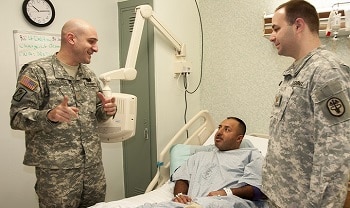
When it comes to your health it’s never a smart idea to over-look symptoms of possible health-related complications and rectal pain, bleeding from the rectum or the presence of blood in your stool are warning signs of a possibly serious complication. If you’re experiencing any of these signs, there’s a possibility that you body is suffering from one or more conditions that include it hemorrhoids, anal fissure, or anorectal cancer (although this is rare).
Hemorrhoids is a condition that should be treated by a GI doctor as Hemorrhoids is a medical condition that means the veins in the rectum and anus have become “swollen” which can cause the veins to bulge which will then result in severe agitation especially during bowel movements. Swollen hemorrhoids may be referred to by your gastroenterologist as “piles” as this is a commonly used medical term for this particular condition.
Hemorrhoids , depending on the severity of you case(if it’s determined by the GI doctor that you in-fact have it), you may undergo an operational procedure where the gastroenterologist will make use of specially designed medical equipment (not that intrusive) to “shrink” and “remove” the hemorrhoids which could actually be done on-site at the GI doctor’s office. Another treatment option is the GI doctor administering an injection in to the hemorrhoid with a specially formulated solution that will result in scarring the hemorrhoid to close it off.
Anal fissure is another condition that could be occurring if bleeding from the rectum is prevalent as this condition is the occurrence of “tearing” in the anus lining which will cause blood to originate out of the rectum which can be noticeable by looking at the stool (is blood noticeable?).
Finally, bleeding from the rectum can “possibly” be a sign of “anorectal cancer ” although this is quite uncommon and not the typical cause of bleeding from the rectal region. “Anorectal cancer” is a malignant infested disease that forms within the tissues and glands of the anus. If you’re suffering with HPV (human papillomaviurs) will increase the chances of “rectum cancer development” so it’s vitally important that you seek diagnosis is warning signs such as rectal bleeding occur.
For elderly/older women, experiencing a bulge or in the rectal area (comparable to a stomach bulge) is a serious sign of either “rectal prolapse” or “vaginal prolapse”; serious yet treatable conditions that can be cured by a gastroenterologist thru the practice of medication(s) or procedural operations.
In the United States it’s estimated that 10% of all elderly women suffer from rectal prolapse with signs ranging from rectal bleeding to the feeling of a “bulge” in the rectal region (noticeable to the touch). Rectal prolapse, specifically, is a condition in which the parts of the large intestine will protrude out of the anus and will cause quite a bit of discomfort, pain, difficulty with making a bowel movement and rectal bleeding.
If such signs occer, don’t procrasitance on receiving treatment. Consult with a GI doctors so treatment preparation(s) can be facilitated.
Vaginal prolapse is another condition that rectal bleeding can be a warning sign of. Vaginal prolapse is a serious condition where the bladder, rectum, urethra, small bowel or uterus will begin to fall out place.
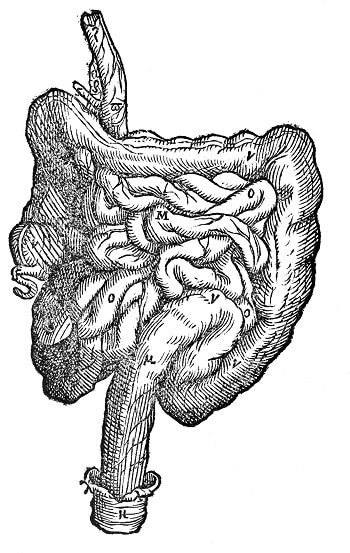
If any of these warning signs occur, it’s time to visit a gastroenterologist so you can receive an accurate diagnosis and treatment.
When it comes to your overall health, maintaining your normal body functions and avoiding complications a gastroenterologist can is a great go-to medical professional as you’ll be able to take advantage of the specialized training that the GI doctors has received so you can alleviate yourself of medical complications.
If any of this signs on this list has occurred, don’t hesitate to seek the intervention of a GI doctor. It’s paramount to ensuring the longevity of your health and will provide you with the peace-of-mind knowing that your symptoms are being affectively diagnosed and of course, treated.
We hope you found this guide helpful. Your gastrointestinal health is important to us and it’s our sincere mission to provide useful medical advice and suggestions.
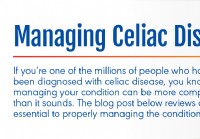 Omgaan met coeliakie
Coeliakie is een immuunreactie op het consumeren van gluten, een eiwit dat voorkomt in granen zoals tarwe. Als u een van de miljoenen mensen bent bij wie coeliakie is vastgesteld, weet u dat het behee
Omgaan met coeliakie
Coeliakie is een immuunreactie op het consumeren van gluten, een eiwit dat voorkomt in granen zoals tarwe. Als u een van de miljoenen mensen bent bij wie coeliakie is vastgesteld, weet u dat het behee
 Wat is de Omentum?
Het omentum is het vetweefsel dat de darmen en andere buikorganen op hun plaats houdt en ze van bloed voorziet, samen met hen fysiek te beschermen. Het omentum (politieagent van de buik) is een dubbe
Wat is de Omentum?
Het omentum is het vetweefsel dat de darmen en andere buikorganen op hun plaats houdt en ze van bloed voorziet, samen met hen fysiek te beschermen. Het omentum (politieagent van de buik) is een dubbe
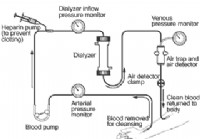 Hemodialysebehandeling voor nierfalen
Hemodialysebehandeling voor nierfalencentrum Doe de nierziektequiz Nierstenen diavoorstelling fotos Hoge bloeddruk diavoorstelling fotos Zoek een plaatselijke nefroloog in uw stad Inleiding tot hemo
Hemodialysebehandeling voor nierfalen
Hemodialysebehandeling voor nierfalencentrum Doe de nierziektequiz Nierstenen diavoorstelling fotos Hoge bloeddruk diavoorstelling fotos Zoek een plaatselijke nefroloog in uw stad Inleiding tot hemo